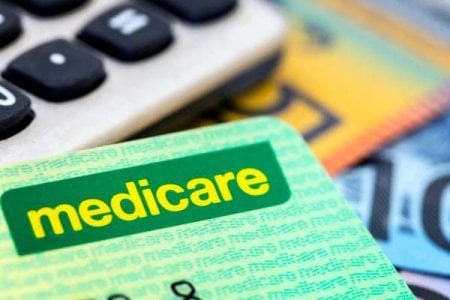Slash your doctor's bills with this huge $189 million Medicare change!
- Replies 10
As the cost of living continues to rise, affecting everything from grocery bills to utility costs, Australians, particularly those over 60, are feeling the pinch.
However, there's some good news on the horizon for those concerned about healthcare expenses.
A significant change is set to make doctor's visits cheaper, offering real cost-of-living relief starting today.
This initiative is a $189 million strategic move by the New South Wales government to ensure more doctors bulk-bill their services.
Rather than providing direct financial assistance to residents for medical appointments, the government is incentivising approximately 2,300 GP clinics across NSW to increase their bulk-billing rates .
They're doing this by offering rebates to clinics that meet certain bulk-billing thresholds. Like everyone else, doctors are dealing with increasing costs, leading many to charge patients out-of-pocket expenses or ‘gap fees’.

The Minister for Finance, Courtney Houssos, has highlighted that this scheme is designed to ‘alleviate financial stress for GP clinics and deliver real cost-of-living relief for families’.
‘This is the first time the NSW Government is making a strategic investment to support bulk-billing rates and protect family budgets,’ Minister Houssos stated.
NSW Health Minister Ryan Park has pointed out that the new scheme should prevent additional costs from being passed on to patients.
This is crucial because millions of Australians have been cutting back on essential medical treatments due to financial constraints.
Finder data from last year revealed that one in seven Australians, or about three million people, had reduced their visits to doctors and dentists due to cost-of-living pressures.
Starting Wednesday, clinics that achieve a bulk-billing rate of 80 per cent in Sydney and 70 per cent in other parts of the state will be eligible for a payroll tax rebate for contractor GPs.
Concerns had been raised about the financial impact on GP clinics with the end of a payroll tax moratorium, but the government has also forgiven $104 million in past payroll tax debts.
‘With GPs becoming more difficult to access, people are either putting off seeing a doctor and allowing their conditions to deteriorate, or they are presenting to hospitals with non-urgent conditions,’ Minister Park said.
The NSW government has recognised that with every 1 per cent drop in bulk billing, there's an increase of 3,000 presentations to emergency departments, a situation they are keen to avoid.
Andrew Cohen, CEO of ForHealth, which is the largest bulk biller in the country, has called this initiative a game-changer for the industry.
‘This will help protect bulk billing accessibility at clinics like ours throughout outer metropolitan and regional NSW,’ he said.
‘In many of these practices, we are expecting the level of bulk-billing to increase as a result.’
‘The removal of any retrospective payroll tax liability for all medical centres is a weight off the shoulders of the industry as clinics will no longer be at risk of closure due to large historic tax bills,’ Mr Cohen added.
Despite the potential savings from not visiting a non-bulk-billing doctor, Australians are urged not to delay seeking medical attention.
Health insurance expert James Martin from Finder warned that neglecting health concerns can have more serious consequences.
‘Aussies have been hit with everything from rising grocery costs and petrol bills to higher home loan repayments and rent,’ he said.
‘Not having the funds to follow up health concerns can have serious consequences—even more so than an empty bank account.’
Finder's research revealed that, along with those reducing their doctor visits, 10 per cent of respondents reported cancelling their health insurance to save money; however, Martin suggested there are better options available.
‘If money is tight, consider reviewing your existing plan to see if it's possible to cut any unnecessary cover,’ he recommended.
‘Dropping down to a lower tier of coverage—from gold to silver or from bronze to basic—or nominating a higher excess can help ease the burden while still maintaining coverage.’
Earlier this year, data revealed that Australians had saved an estimated $15 million thanks to another government funding package for Medicare bulk-billing.
The cost-of-living measure tripled the payments to doctors who waived out-of-pocket fees, or ‘gap fees’, for children under 16, pensioners, and concession card holders.
This affected around 11.6 million vulnerable Australians. As a result, the bulk-billing rate among GPs increased by 2.1 per cent, amounting to 360,000 additional appointments.
The largest rise occurred in Tasmania (5.7 per cent), followed by South Australia (3.8 per cent), Western Australia (2.4 per cent), and Queensland (2.2 per cent).
Before the change, bulk-billing rates had fallen to 80.2 per cent, the lowest in a decade, raising concerns that many Australians—already struggling with rising costs—were missing out on essential health care.
The government’s recent $189 million Medicare changes, aimed at making doctor visits more affordable, have been welcomed as a much-needed cost-of-living relief.
However, despite these efforts to ease the burden, a surge in GP visits earlier this year led to calls for further support.
In April, the government faced pressure to boost bulk-billing rebates even further, but ultimately denied additional increases, leaving many Australians concerned about the future of affordable healthcare as demand continues to rise.
 As members of the Seniors Discount Club, we encourage you to take advantage of this initiative and spread the word to friends and family.
As members of the Seniors Discount Club, we encourage you to take advantage of this initiative and spread the word to friends and family.
Have you had experiences with bulk billing or noticed changes in your healthcare costs? We'd love to hear from you in the comments below.
However, there's some good news on the horizon for those concerned about healthcare expenses.
A significant change is set to make doctor's visits cheaper, offering real cost-of-living relief starting today.
This initiative is a $189 million strategic move by the New South Wales government to ensure more doctors bulk-bill their services.
Rather than providing direct financial assistance to residents for medical appointments, the government is incentivising approximately 2,300 GP clinics across NSW to increase their bulk-billing rates .
They're doing this by offering rebates to clinics that meet certain bulk-billing thresholds. Like everyone else, doctors are dealing with increasing costs, leading many to charge patients out-of-pocket expenses or ‘gap fees’.

A $189 million NSW initiative aims to boost bulk-billing doctors, easing residents' financial strain. Credit: Shutterstock
The Minister for Finance, Courtney Houssos, has highlighted that this scheme is designed to ‘alleviate financial stress for GP clinics and deliver real cost-of-living relief for families’.
‘This is the first time the NSW Government is making a strategic investment to support bulk-billing rates and protect family budgets,’ Minister Houssos stated.
NSW Health Minister Ryan Park has pointed out that the new scheme should prevent additional costs from being passed on to patients.
This is crucial because millions of Australians have been cutting back on essential medical treatments due to financial constraints.
Finder data from last year revealed that one in seven Australians, or about three million people, had reduced their visits to doctors and dentists due to cost-of-living pressures.
Starting Wednesday, clinics that achieve a bulk-billing rate of 80 per cent in Sydney and 70 per cent in other parts of the state will be eligible for a payroll tax rebate for contractor GPs.
Concerns had been raised about the financial impact on GP clinics with the end of a payroll tax moratorium, but the government has also forgiven $104 million in past payroll tax debts.
‘With GPs becoming more difficult to access, people are either putting off seeing a doctor and allowing their conditions to deteriorate, or they are presenting to hospitals with non-urgent conditions,’ Minister Park said.
The NSW government has recognised that with every 1 per cent drop in bulk billing, there's an increase of 3,000 presentations to emergency departments, a situation they are keen to avoid.
Andrew Cohen, CEO of ForHealth, which is the largest bulk biller in the country, has called this initiative a game-changer for the industry.
‘This will help protect bulk billing accessibility at clinics like ours throughout outer metropolitan and regional NSW,’ he said.
‘In many of these practices, we are expecting the level of bulk-billing to increase as a result.’
‘The removal of any retrospective payroll tax liability for all medical centres is a weight off the shoulders of the industry as clinics will no longer be at risk of closure due to large historic tax bills,’ Mr Cohen added.
Despite the potential savings from not visiting a non-bulk-billing doctor, Australians are urged not to delay seeking medical attention.
Health insurance expert James Martin from Finder warned that neglecting health concerns can have more serious consequences.
‘Aussies have been hit with everything from rising grocery costs and petrol bills to higher home loan repayments and rent,’ he said.
‘Not having the funds to follow up health concerns can have serious consequences—even more so than an empty bank account.’
Finder's research revealed that, along with those reducing their doctor visits, 10 per cent of respondents reported cancelling their health insurance to save money; however, Martin suggested there are better options available.
‘If money is tight, consider reviewing your existing plan to see if it's possible to cut any unnecessary cover,’ he recommended.
‘Dropping down to a lower tier of coverage—from gold to silver or from bronze to basic—or nominating a higher excess can help ease the burden while still maintaining coverage.’
Earlier this year, data revealed that Australians had saved an estimated $15 million thanks to another government funding package for Medicare bulk-billing.
The cost-of-living measure tripled the payments to doctors who waived out-of-pocket fees, or ‘gap fees’, for children under 16, pensioners, and concession card holders.
This affected around 11.6 million vulnerable Australians. As a result, the bulk-billing rate among GPs increased by 2.1 per cent, amounting to 360,000 additional appointments.
The largest rise occurred in Tasmania (5.7 per cent), followed by South Australia (3.8 per cent), Western Australia (2.4 per cent), and Queensland (2.2 per cent).
Before the change, bulk-billing rates had fallen to 80.2 per cent, the lowest in a decade, raising concerns that many Australians—already struggling with rising costs—were missing out on essential health care.
The government’s recent $189 million Medicare changes, aimed at making doctor visits more affordable, have been welcomed as a much-needed cost-of-living relief.
However, despite these efforts to ease the burden, a surge in GP visits earlier this year led to calls for further support.
In April, the government faced pressure to boost bulk-billing rebates even further, but ultimately denied additional increases, leaving many Australians concerned about the future of affordable healthcare as demand continues to rise.
Key Takeaways
- A $189 million initiative in New South Wales aims to increase the number of doctors who bulk-bill, easing the financial burden on residents.
- Clinics that meet bulk-billing thresholds will receive a payroll tax rebate and historical payroll tax liabilities will be waived to support GP clinics.
- The NSW government believes this measure will reduce unnecessary emergency department presentations and secure access to bulk-billed GP services, especially in outer metropolitan and regional areas.
- Health experts and the government urged Australians not to delay seeking medical treatment due to cost, highlighting the availability of bulk billing and the importance of maintaining appropriate health insurance coverage.
Have you had experiences with bulk billing or noticed changes in your healthcare costs? We'd love to hear from you in the comments below.







